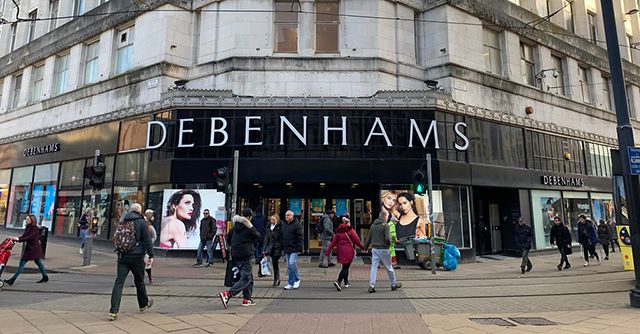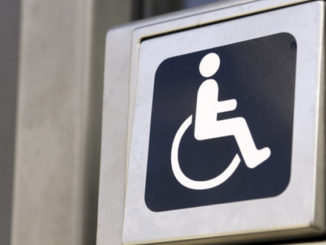
“It’s weird to say the energy in a loading bay on Parnell Street, on a cold October night is kind of electric.” This is the bold claim made by Seán Powney, a DCU graduate and former Debenhams employee. “Everyone is so supportive of each other, there’s this kind of feeling of ‘we stuck it out for so long, we can’t give up now.”
Approximately 202 days have passed since the Debenhams workers first demanded their 2-Plus-2 redundancy package; two weeks of statutory leave (owed by the government) and two weeks of salary (owed by Debenhams), both per service year.
Currently, they are only being offered two weeks of statutory leave per service year.
Debenhams Ireland officially went into liquidation in April 2020. The workers’ union, Mandate, have been in constant negotiations with the liquidator KPMG since the liquidation began.
Many of these workers have been at Debenhams for up to 30 years. They are not receiving a redundancy package originally agreed to back in 2016.
Even with a recent High Court injunction threatening the workers with Gardaí intervention, the spirits remain high.
Powney talked about people from Henry Street – the location of one of the Debenhams stores – and Moore Street bringing sweets, soft drinks and coffee to the activists doing late night shifts. He noted the solidarity from both workers and the general public.
Powney worked in Debenhams for two years, with one year being part-time while finishing his Multimedia course.
Fast forward to today, he is out every weekend with recently laid-off shop assistants fighting for a fair redundancy package.
One of his comrades on the picket is Sadhbh Mac Lochlainn, a UCD student. Strikes like the Debenhams picket are only the “tip of the iceberg” according to Mac Lochlainn.
Although not a former employee of Debenhams, she lost her job as a waitress at the beginning of the pandemic. Amongst others, she is one of many student activists that feel compelled to protest in order to protect labour rights, despite the lack of financial gain.
Currently a final year Politics and Art History student, she delved into the intersection between student rights and worker rights.
“I don’t know that many people who went to college who didn’t have to work,” says Mac Lochlainn.
“Even if you don’t have to, you work your summer job or you’re gonna come out of college and become a worker,” said Sadhbh, in relation to how important it is for students to advocate for the rights of workers.
“As a worker myself who lost my job during the pandemic, I saw these workers as comrades, as people I was in solidarity with and that’s why I threw myself in heads first” she said
KPMG offered a potential deal to the strike’s trade union Mandate which was a €1 million allocation on top of statutory payments from the government.
It is a paltry sum when divided amongst the workers, especially when considering Debenhams Ireland sustained record-high revenue increases in 2018, such as their digital sales going from £1 million to £149 million.
“No one expected this to go on as long as it did. It became a game of passing the buck back and forth,” said Powney.
The Taoiseach Micheal Martin and KPMG have claimed neither body can instruct the other, meaning the workers feel, in Powney’s words, that “the government and KPMG aren’t on our side”.
Figures obtained from a source close to the negotiations estimated that €1 million spread amongst the entire Debenhams workforce would only amount to less than one-fifth of a week owed. Those involved on the strike feel that KPMG is getting away with paying the bare minimum.
This payment would be partially generated from the sale of stock. This has been described as “robbery” and “derisory” by representatives of the workers.
A spokesperson from KPMG said that the cost price of stock was worth €11 million but the Debenhams shop stewards have argued that, by their estimations, current stock is €25 million. Even with the lower estimation from KPMG, it does not cover the workers’ needs.
To put this figure into perspective, a part time worker with 18 years’ service would only receive €554, based on a case study from the 11 Debenhams shop stewards. This is only a quarter of the average rent price in Dublin in 2020.
On September 8th, Powney and Mac Lochlainn, along with four others, were both taken into custody at Store Street Garda Station after occupying the store in Henry Street. They were later released without charges as the protest was a civil matter, not a criminal one.
Despite being detained, they have not been dissuaded from the cause.
“I’ve learned more in the last 6 months that I’ve been striking that I probably did in a year, going to lectures, the normal college life,” says Powney, when talking about what he gained from striking.
“Get involved with these kinds of things, it opens your eyes a little bit and it gives you so much life experience,” he encourages students.
Students live in precarious times. Barriers to education have never been higher, with no cut to the student contribution charge as of Budget 2021; rents in Dublin are one of the highest in the eurozone; and 21 per cent of PUP recipients are under 25 years old, according to a survey from the National Youth Council of Ireland.
An unfortunate truth is that Ireland is set to be hit with its worst recession in history, according to the Economic and Social Research Institute’s recent Quarterly Economic Commentary.
We are beginning to see the effects of this recession on workers and this will include students. One of the ways we can help students is by ensuring workers get the money they are owed for due labour.
One of the most common words you will see regarding this strike is the word “precedent”. The status quo in which Irish workers’ rights have been in since the 1990 Industrial Relations Act. The way the Debenhams strike concludes will establish how workers are treated for decades to come in this country.
Regardless of the result, we can be sure that the future of Ireland’s labour disputes will be driven by impassioned young voices, eager to show that the rights of workers will not be taken away, and certainly not without a fight.
Zoe Thornes
Image Credit: Flickr



